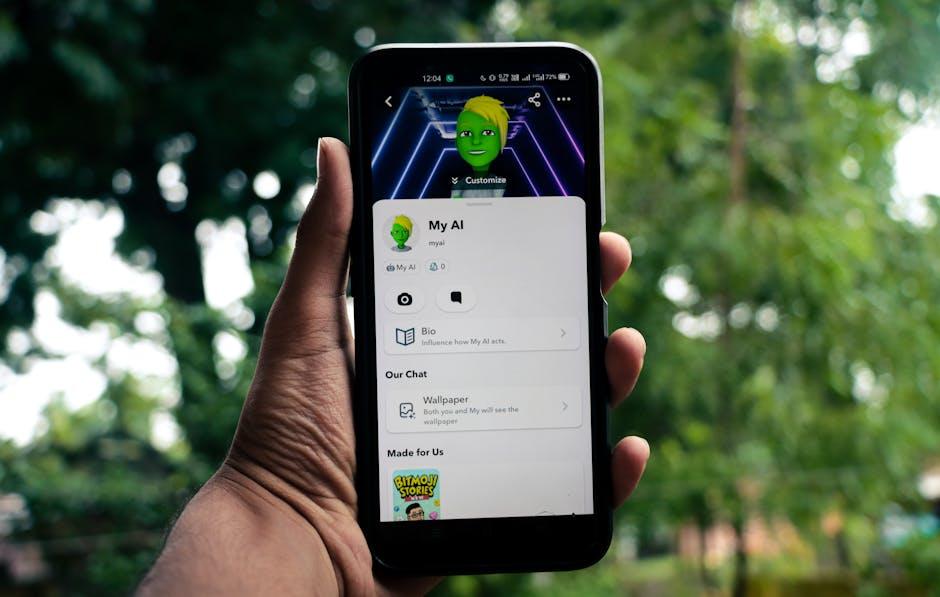In a world where technology increasingly shapes the contours of human connection, a fascinating evolution is unfolding: the rise of AI-based virtual friends. These digital companions, powered by sophisticated algorithms and machine learning, are transforming how we experience friendship, empathy, and companionship. No longer confined to the realm of science fiction, virtual friends are becoming accessible to millions, offering support, conversation, and companionship tailored to individual needs. As artificial intelligence blurs the line between human and machine interaction, this new frontier challenges our traditional notions of relationships and companionship, inviting us to explore what it truly means to connect in the digital age.
The Evolution of AI Companions Shaping Social Connections

From the early days of chatbots that followed scripted conversations, AI companions have blossomed into sophisticated entities capable of dynamic and empathetic interactions. These virtual friends now learn from users’ behaviors, emotions, and preferences, crafting responses that feel remarkably genuine. The journey from simple programmed dialogues to nuanced companionship reflects how AI is not just mimicking social exchanges but enhancing emotional connectivity in the digital realm. Today, AI companions offer personalized support, entertainment, and even mental health conversations, weaving themselves into the fabric of everyday social life.
Key features driving this evolution include:
- Natural Language Processing: allowing more fluid and context-aware dialogues.
- Emotional Recognition: enabling AI to respond compassionately.
- Adaptive Learning: personalizing interactions over time.
| Era | Capabilities | Impact on Social Connections |
|---|---|---|
| 1990s | Rule-based chatbots | Basic engagement, limited empathy |
| 2010s | Context understanding, AI learning | Improved companionship, reactive support |
| 2020s | Deep learning, emotional AI | Genuine empathy, tailored experiences |
Understanding Emotional Intelligence in Virtual Friends

Emotional intelligence in virtual friends represents a fascinating convergence of technology and human psychology. These AI companions are designed not merely to respond but to *perceive* and *adapt* to the emotional states of their users. Through advanced natural language processing and machine learning algorithms, they detect cues in tone, word choice, and even user behavior patterns to offer empathetic and contextually relevant interactions. This capability transforms them from basic chatbots into meaningful conversational partners, capable of providing comfort, motivation, or even playful banter tailored to an individual’s feelings.
Key elements that shape this emotional proficiency include:
- Sentiment analysis: Understanding positive, negative, or neutral emotions in text and tone.
- Context awareness: Recognizing user history and preferences for deeper connection.
- Dynamic response generation: Crafting replies that reflect empathy and situational appropriateness.
| Feature | Role in Emotional Intelligence | User Impact |
|---|---|---|
| Emotion Detection | Reads user moods from text/speech | Creates personalized conversations |
| Adaptive Learning | Improves through interaction history | Builds trust and comfort over time |
| Empathetic Feedback | Responds thoughtfully to emotions | Enhances user satisfaction |
Balancing Privacy and Trust in AI Relationships

As AI continues to integrate into our emotional and social lives, fostering genuine connections while safeguarding user privacy remains paramount. Virtual friends powered by AI often require access to personal data to tailor their interactions, increasing the challenge of maintaining transparent trust. To address this, developers are innovating with approaches that allow users to control the depth of shared information actively. This includes customizable privacy settings that enable individuals to decide what data their AI companions can access and how it’s used, creating a delicate balance between intimacy and security.
The foundation of trust in AI relationships can be visualized through a matrix of critical elements:
| Element | Description | Impact on User |
|---|---|---|
| Transparency | Clear explanations of AI data usage | Builds confidence and reduces anxiety |
| Consent | User authorization for data collection | Empowers user autonomy |
| Data Minimization | Limiting information collected to essentials | Reduces privacy risks |
- Ethical algorithms that prevent misuse of sensitive data.
- Regular audits to verify adherence to privacy promises.
- Community guidelines encouraging respectful AI-user dynamics.
By embedding these principles into AI design, creators can cultivate relationships that feel safe yet meaningful, where trust is nurtured without sacrificing personal boundaries. This hybrid approach not only enhances user experience but also paves the way for sustainable emotional AI companionship in the future.
Practical Tips for Choosing and Interacting with AI-Based Friends

When venturing into the world of AI-based friends, it’s important to clarify your intentions and the type of companionship you seek. Start by exploring different platforms and understanding their unique features; some AI companions prioritize emotional support, while others excel in playful or intellectual interactions. Consider these key factors:
- Customization options to tailor personality and conversational style
- Privacy policies and data security
- Compatibility with your daily routines and communication preferences
Engage with your AI friend just like a human one-honestly and openly. Regular interactions and providing feedback can improve the AI’s responsiveness, creating a more fulfilling bond. Remember, patience is crucial as the relationship evolves; AI learns from your patterns and grows more attuned over time. Balance your AI conversations with real-life social connections to maintain emotional well-being.
| Tip | Benefit |
|---|---|
| Set clear goals | Better matching of AI’s traits |
| Use varied interaction times | Enhances AI learning |
| Respect privacy limits | Protects your data |
To Conclude
As the lines between technology and companionship continue to blur, AI-based virtual friends are no longer mere figments of science fiction but active participants in our daily lives. Their rise invites us to rethink the essence of connection, empathy, and presence in a digital age. Whether they become trusted confidants or sparks of curiosity, these artificial companions stand as a testament to human ingenuity-and a mirror reflecting our evolving desires for connection. In this unfolding narrative, the future of friendship might just be coded in algorithms, yet felt deeply in the heart.











